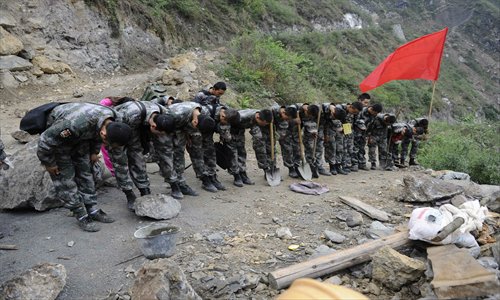Quake victims desperate for relief goods as rain brings new dangers

Rescue and relief work entered its fourth day on Tuesday following a 7.0-magnitude earthquake in Ya'an, Southwest China's Sichuan Province, as new threats brought by rainfall began to loom.
As of 6 pm Tuesday, the death toll had climbed to 193, with 25 missing, according to the Sichuan provincial government emergency command center. Nearly 2 million people have been affected by the quake, and over 233,000 have been relocated.
Rescue efforts continued in Baoxing county, one of the hardest-hit regions, on Tuesday, with firefighters searching for signs of life with the help of sniffer dogs, though the golden time for rescue, namely 72 hours following the quake, had passed.
In other regions, rescuers also refused to give up hope.
Xu Deshi, former head of the disaster emergency rescue department of the China Earthquake Administration, told the Global Times Tuesday that there had been quite a number of precedents of victims being pulled out alive even after 72 hours, adding that more than 50 people survived beyond the golden time in the deadly Wenchuan quake in 2008.
"This time, the quake-hit regions are scattered and many of them are deep in the mountains, so we can't rule out the possibility of finding more survivors," Xu said.
Besides rescue efforts, Xu also noted that currently, the key to the relief work is to calm those affected and bring their lives back to normal.
The Sichuan government has allocated 1.2 billion yuan ($195.7 million) for relief work, and received 321 million yuan in donations. Some 40,000 tents, 159,300 quilts and 2,188 tons of food and drinking water had also been allocated, said Hou Xiongfei, head of the media office of the Sichuan provincial government.
On Tuesday, four trucks loaded with food reached Baoxing, and the supplies were distributed to its affiliated villages.
Xiong Ping, a deputy director of the county's civil affairs bureau, told the Global Times the supplies were distributed based on earlier reports by lower-level authorities.
The local disciplinary watchdog has dispatched inspection groups to oversee the distribution of supplies.
According to local officials, the county is in dire need of tents, generators and medicine. Electricity has not been restored in the county seat.
The Global Times reporter learned that Xueshan village, where hundreds of people reside, only received 10 tents.
Many people in the county had to sleep outdoors or in makeshift tents, complaining that they were being ignored.
In Lingguan township, Baoxing, dozens of villagers were pictured holding banners reading "we are cold and hungry," due to the lack of supplies as a result of disruptions to local transport routes.
The Beijing Times Tuesday reported that more than 100,000 people in Tianquan county were desperate for supplies and assistance, and over 90 percent of residential buildings had been declared "unsafe."
Lingering rainfall in the quake-hit regions also raised concerns about secondary disasters.
The Center for Earth Observation and Digital Earth at the Chinese Academy of Sciences has analyzed airborne remote sensing images taken after the disaster. Guo Huadong, director of the center, told the Global Times that the county seat of Lushan, epicenter of the quake, and other affected regions are situated in a flat area, so the danger of landslides is much smaller compared with that during the Wenchuan quake, and at the moment no relocation plan has been drawn up.
"However, some areas have seen landslides, and the rain will make it more prone to such hazards," Guo warned.
Xu also stressed the need to remain vigilant against secondary disasters, adding that irrigation and engineering departments should step in to prepare for the worst case scenario.
